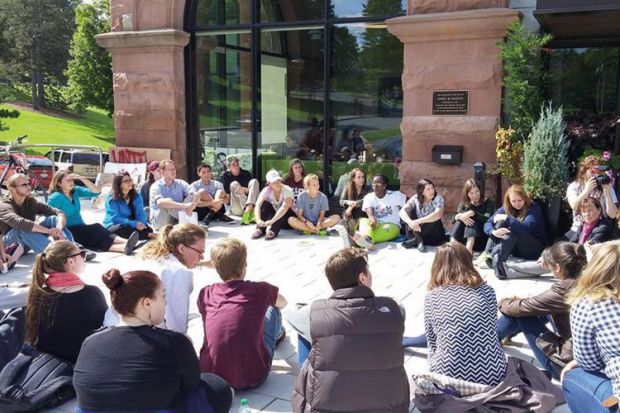United States
Sit-in ends after improvements promised
A five-day sit-in at Colgate University in New York, organised to protest against the institution’s lack of diversity and its alleged poor treatment of minority students, ended after the university responded to the protesters’ 21-point “roadmap” to improve the situation on campus. The resulting plan includes a commitment to install security cameras on campus buses in an effort to combat racist slurs and to work with all faculty search committees to increase multicultural representation.
Spain
Call for alignment with Europe
José Ignacio Wert, the Spanish minister of education, culture and sport, used a ceremony to mark the beginning of the new academic year to deliver a wide-ranging speech about higher education. He spoke of the need for greater alignment with the rest of Europe, in curricula and teaching methods, and of his desire to attract more international (and particularly hispanophone) students. He said that his department was also planning to launch an Integrated University Information System to provide details about graduate employability.
Turkey
Get rid of my organisation, says head of watchdog
Turkey’s higher education watchdog should be abolished, according to its president. Gökhan Çetinsaya, who heads the country’s Higher Education Board (YOK), said that the body had become unworkable as a bureaucratic institution and that a new coordinating agency was needed to lead university reform. In a report, A Roadmap for Turkey’s Higher Education, Professor Çetinsaya said that it was time for Turkey to make a clean break from YOK, which conjured up bad memories for many academics who dislike the authoritarian control it has exercised over universities.
Ecuador
Overseas postgraduate scholarships approach 10,000
Almost 10,000 Ecuadorians have been awarded scholarships to complete postgraduate study abroad over the past seven years as part of a “knowledge revolution”. René Ramírez, the secretary of higher education, science, technology and innovation, oversaw the latest 438 awards at an event last month. The scheme, designed to allow students to get master’s and doctorate qualifications at some of the world’s top universities, has been funded to the tune of $714 million (£442 million) to date.
South Africa
First black head of ‘apartheid institution’ seeks to build unity
A South African university’s first black leader has been installed just days after it was branded an “apartheid institution” by the minister of higher education. Blade Nzimande criticised North-West University in Potchefstroom after a video emerged of students performing a Nazi-style salute. The campus “remains fundamentally an apartheid institution”, he said, claiming that non-white and non-Afrikaans students were targets of rituals designed to “dehumanise”. New vice-chancellor Dan Kgwadi has said that he wants to move staff and students “towards a social cohesion direction”.
Australia
Which v-cs earn the most?
Australia’s most highly paid vice-chancellor earned just under A$1.1 million (£595,000) in 2013, according to an analysis of university annual reports by the National Tertiary Education Union. The sum was earned by the Australian Catholic University’s Greg Craven. Million dollar-plus salaries were also earned by leaders of the universities of Sydney, Melbourne, Queensland, Western Australia and Queensland University of Technology. The average salary was A$770,000. Edith Cowan University’s Arshad Omar had the lowest salary, A$445,000.
Register to continue
Why register?
- Registration is free and only takes a moment
- Once registered, you can read 3 articles a month
- Sign up for our newsletter
Subscribe
Or subscribe for unlimited access to:
- Unlimited access to news, views, insights & reviews
- Digital editions
- Digital access to THE’s university and college rankings analysis
Already registered or a current subscriber? Login

